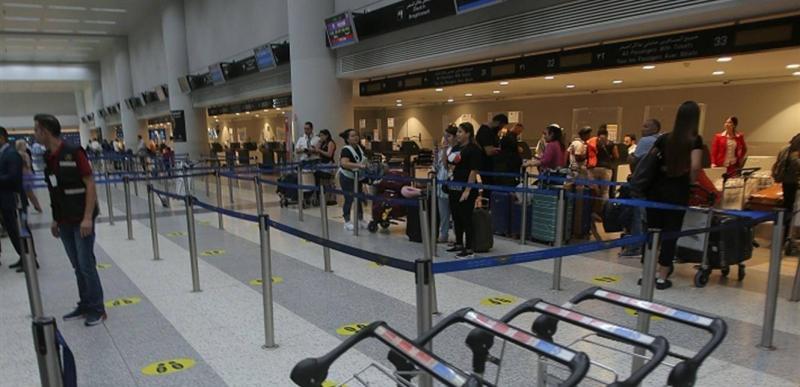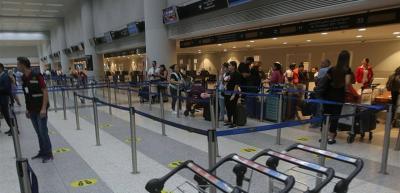The atmosphere is remarkably positive, as statistics from the Directorate General of Civil Aviation indicate that from the beginning of July until the 11th, 181,791 passengers entered Lebanon compared to 93,807 who left the country. Cafés, restaurants, and entertainment venues are all "fully booked," and hotel occupancy rates have risen to about 80 percent. Attention is drawn to the fresh dollars that visitors bring. To what extent will these dollars improve the exchange rate in Lebanon?
Lebanon is counting on the summer season to revive its economy and emerge from the crisis that has paralyzed its economic activity for more than two years, benefiting this time from the currency crisis, which makes it comparatively cheaper than other countries. Lebanon expects to receive between three to four billion dollars from the influx of tourists over three months. This amount is equivalent to the support Lebanon aims to receive from the International Monetary Fund, distributed in installments over 46 months. Anyone hearing these figures might think that the expatriates' dollars will lead to an improvement in the exchange rate of the dollar against the lira. However, the situation is not so simple, and the exchange rate will not decrease because the dollars that entered the market during the summer season will not benefit positively.
Where then do the expatriates' dollars go? What is their fate?
### Factors Affecting the Exchange Rate
According to economist Walid Abu Suleiman, "Several factors affect the exchange rate. First is the principle of supply and demand, which is one of the essential factors affecting market economy. Second is the confidence in the economy since the national currency reflects the economy. Lastly, the current lack of political and security stability in the country." Practically, the inflow of these dollars will lead directly to a balance between supply and demand for dollars, which will ensure stability in the exchange rate in the short term. However, in the long term, after the end of the tourist season, it is likely that the dollar will rise again in the absence of any serious and effective reforms, along with the lack of an agreement with the International Monetary Fund.
The same source points out that "the dollars entering the market during the summer season will not be distributed across all sectors, due to the lack of a banking sector capable of utilizing these dollars and reinjecting them into the veins of the economy, in addition to the loss of confidence in this sector. This means that most of their dollars will not enter the economic cycle as investments and savings to create job opportunities and new companies, but will only go towards consumption, benefiting the hotel, restaurant, and various tourism sectors. Also, with the increase in consumption, the demand for dollars for imports will rise to meet the needs of expatriates and tourists, which explains why part of these dollars is spent abroad."
### The Fate of Expatriates’ Money
"Most expatriates have funds and accounts in Lebanese banks," says financial advisor Michel Qozh, "and they fell into the trap before the crisis began in Lebanon when banks offered various incentives to attract their fresh dollars with interest rates exceeding 10 percent. Today, the expatriates' money is stuck in banks, so they will try to use it in dollars or lira, either for their vacations or to help their families in Lebanon. Since this money will not be enough to cover their vacation expenses in Lebanon, we see them equipped with fresh dollars. The expatriate will not bring his money to deposit it in Lebanese banks after losing confidence in them, especially after global interest rates have risen to 3 or 4 percent. Therefore, these dollars will not save the Lebanese lira."
### No Improvement in the Monetary Situation Without Serious Plans
Qozh believes, "It is difficult to save Lebanon's deteriorating economy this way. First, all sectors in Lebanon need to be restructured, and there must be an agreement with the IMF and the establishment of security and political stability. Only then can we rely on the dollars from expatriates. For instance, expatriates will bring their money to Lebanon, especially from Africa and the Gulf, to invest through long-term productive projects." Abu Suleiman also emphasizes that "there can be no return to a normal economy without the banking sector returning to its normal state to regain investors' trust."
Lebanon has previously seen an influx of expatriates in past years, even if this year is not as dense. Last year, several tourists visited Lebanon, and the dollar soared, approaching 30,000 lira, with no improvement in the monetary situation observed. Therefore, we can conclude that the influx of expatriates' dollars into the Lebanese market is essential to stabilize the exchange rate. However, without any clear and effective monetary plan to utilize these inflows, their impact will diminish after a short period.




